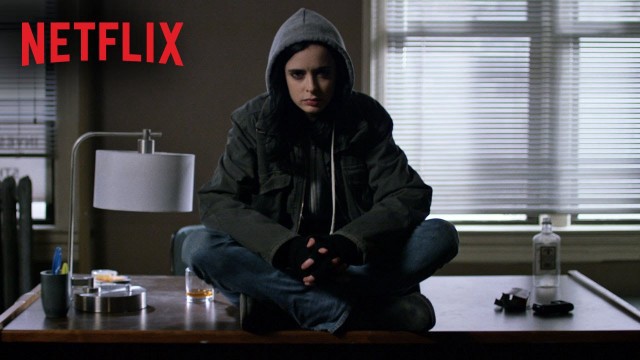Class Matters: How ‘Carol’ and ‘Jessica Jones’ Do Money

Earlier this year, I got to consume two pieces of popular culture back to back, the movies Grandma and Sleeping With Other People. Over Thanksgiving weekend, I had a similar opportunity to catch up; I used it to watch the Todd Haynes movie/tone poem Carol and more of the new Netflix series Jessica Jones. I was startled by how real both properties are about the power of money.
Carol is a romantic melodrama in glorious technicolor set in mid-20th century New York City and based on the Patricia Highsmith novel The Price of Salt. The main character, Therese Belivet (played by the fantastic Rooney Mara), lives in artistic penury: it’s not clear if she’s in a boardinghouse, but there are plenty of other tenants in the building, cracks in the walls, and phones in the hallways. There’s a great sequence in which she wakes up one morning and fumbles with matches to get the oven going for warmth.
Still, she seems proud to be self-sufficient. No “mother, mother, may I have another”- type Millennial she. Though her boyfriend is eager to marry her and take her abroad, Therese puts him off, continuing to live by and to support herself with a crappy job as a salesgirl in a midtown department store.
It is while she is working the counter of that department store one pre-Christmas morning that she meets a wealthy matron in from the Jersey suburbs, Carol Aird (a luxurious Cate Blanchett, wrapped up in and somehow magnified by furs). The women are drawn to each other, but there are also more than midcentury mores keeping them apart: they’re from entirely different social classes. They hardly know how to talk to each other. When they go out to lunch at a fancy restaurant of Carol’s choosing, Carol orders her meal and after a brief hesitation Therese tells the waiter, “I’ll have the same.” She’s so out of her depth that she knows that any choice she makes would somehow be wrong.
Carol keeps murmuring things like, “What a strange girl you are.” Therese is strange: tense but eager; pale, big eyed, and waifish like a queer Audrey Hepburn. But your heart aches for her because she’s not just struggling with suddenly finding herself attracted to a woman; she’s falling for someone older, more glamorous, more polished, more experienced, and much, much richer. Who can’t relate to that?
This is an issue fairy tales don’t address. Once Cinderella and Prince Charming defeat all obstacles and are at last together, married, and alone, how on earth do they relate to each other?
Jessica Jones (Krysten Ritter), the superhero center of the new Netflix show based on a Marvel character, is, like Therese, tense, pale, big eyed, waifish, broke, and almost stupidly independent. Her foil, Kilgrave, is, like Carol, older, glamorous, polished, experienced, and rich. But in this case he’s her nemesis, not her potential lover; indeed, he’s her rapist, a supervillain who has the ability to override other people’s free will and who once used that power to abduct Jessica and keep her.
Kilgrave’s power works as a potent metaphor for what wealth can accomplish. True, he takes things to extremes, but a lot of what we see him do is stuff that lots of powerful, successful men get away with. He dates, and controls, beautiful younger women, decides for them what they’ll eat and do and wear. He demands the best table in restaurants as well as extra-special treatment while he’s there. He gets what he wants, in short, when he wants it. Just like lots of rich folks do.
The fact that Jessica is broke, by contrast, serves as testament to her integrity, since she has superpowers too. She could use them for nefarious purposes, the way Kilgrave does, or at least to get a decent pair of jeans. Instead she lives in, and works out of, a roach-infested flat in Hell’s Kitchen. She wears the same clothes every day. When she breaks her door, it stays broken, because she doesn’t have the money to fix it.
Money isn’t all bad in the Jessica Jones universe: Jessica’s best friend Trish is loaded, having been forced into child stardom by her selfish mom. Conspicuous consumption, though, is, at best, fraught, and at worst nefarious. Our heroes don’t care about money; they care about justice, about doing the right thing. It’s a kind of refreshing message to see on TV these days, almost as retro, and as rare, as two women going out for a martini lunch and staring longingly at each other through cigarette smoke, not even daring to hold hands.
Support The Billfold
The Billfold continues to exist thanks to support from our readers. Help us continue to do our work by making a monthly pledge on Patreon or a one-time-only contribution through PayPal.
Comments